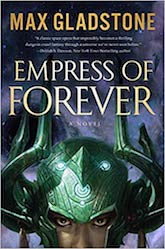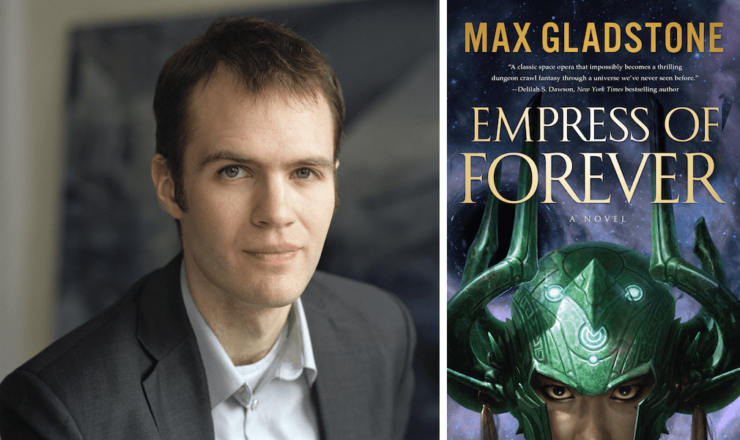Max Gladstone, author of the Craft Sequence books and the recently published Empress of Forever, took to Reddit’s subreddit r/fantasy yesterday for an AMA about his process, his inspirations, and any upcoming works. Gladstone was very thorough with his answers—check out the highlights below!
The AMA started out with factory41 asking, “With Empress out and Time War coming out soon, what’s next?”
A lot of things I can’t talk about! I can say there’s something very concrete which I can’t talk about that should be showing up this fall. Beyond that, I have a handful of projects in progress, and a terrifying number of ideas that might turn into something cool.
Oh, and of course, /u/amalelmohtar and I are working on adapting Time War to television!
Users, like diffygirl, were interested in Gladstone’s choice of protagonist. They asked, “Why did you choose to make the protagonist a tech billionaire? (I haven’t read the book yet, but I’m always intrigued when the main character doesn’t follow one of the usual blueprints).”
Without getting into spoilery territory—I liked the thought of taking someone a bit like a classical super rich Heinlein protagonist, the kind of entity folks like Musk and Bezos self consciously try to channel and model themselves off, and throwing them entirely off their game, depriving them not only of resources and name but of the world where they know what buttons to push. Viv is extremely not an everyperson—but, so far removed from her world, she can sort of stand in for one, while being specific enough to carry the weight of the story.
yikesus loved how Gladstone incorporated elements from Journey To The West into Empress of Forever, and even asked about the equivlaent of who’s who. “So far I got that Zanj is obvious Sun Wukong. Viv/Hong share elements of Tang Xuanzang. Gray is Zhu Bajie but with Sha Wujing backstory. Oh and of course the Empress is the Jade Emperor!,” they wrote.
I grew up with Journey to the West—it’s not what I’d call ubiquitous in middle Tennessee but I found a very brief prose rendering and adaption when I was in grade school, fell in love with it, and was lucky to have parents who thought Anthony C Yu’s four volume UChicago translation was a good gift for a tenth birthday. I still have that edition on my shelf—it’s one of my most prized possessions. I grew up with Journey to the West, fell in love with anime largely through it (Dragonball Z), and when I started studying Chinese, reading the original text of Xiyouji was one of my main goals.
Buy the Book


Empress of Forever
Probably the best way to talk about the connection between Xiyouji and this book is that when I was a kid I saw, on the cover of that brief English prose rendering, a newspaper blurb that read “Cosmic Kung Fu on the Scale of Star Wars!” Now, that’s not really Xiyouji… but the notion stuck in my head. What if it was? That structure of exploration, discovery, tight squad dynamics, and interpersonal relationships against a vast canvas would make an amazing springboard for a huge planet-smashing posthuman space story of the sort I was devouring by the truckload at that time. And on some level everything I’ve ever done in the Craft Sequence has an echo of the dynamic between Sun Wukong and his old fellow monsters—old warriors across the table. The whole thing became this glittering gestalt, and absorbed along the way a number of questions I was asking about power, identity, technology, and the singularity, all seen through prisms that draw a great deal from my understanding of Buddhism…
As for the character correspondences—Zanj is the closest to her Xiyouji springboard, intentionally—I thought it was important to be honest about the inspiration I was drawing with her character design. Viv and Hong both started with riffs on Tang Xuanzang—Tang Xuanzang in Xiyouji has a sense of a “contemporary” character, or near-contemporary, questing through a fantastical landscape, which informed Viv’s story, but his monastic leanings couldn’t hang on Viv’s character, and Hong grew out of that, while assuming some of Wujing’s quiet determination. Gray started with Zhu Bajie’s appetite and shapeshifting and his character really launched off in a different direction. And yes, Xiara started with me always having a fondness for those sequences where the rest of the team has been incapacitated by a demon and the Dragon Horse turns back into a dragon to save the day. He’s such a nice and helpful dragon! And everyone forgets he’s there 85% of the time. Please, won’t someone think of the dragons?
madmoneymcgee asked,”What steps did you take to try to ensure that you were being sensitive with the characters in your stories that have real-world marginalized identities (like Kai in Full Fathom Five)”
I start by, just in my everyday life, without any book or project in mind, trying to listen to people I know when they tell me what their lives are like—talking to them, yeah, learning from them. Not in a creepy eyes-to-window TELL ME ABOUT YOURSELF sort of way, just in the way you try to learn about the world. If you’re inviting a friend over to your house for dinner, you’d want to ask about their allergies or dietary restrictions so you don’t make kung pao chicken for a vegetarian with a peanut allergy—it’s kind of like that. And in this modern social media world, it’s (sometimes terrifyingly) easy to see what scares your friends, what about the world makes them upset.
So, just paying attention like that is the start. And I have to stress, this isn’t with a project in mind. Not at its best. This is just… being aware of people around you in the world.
When I’m writing a book featuring someone who has a marginalized identity, I do specific research—academic sources, diaries, primary reading, mythology even.
Then, while I’m writing, I try to picture people I know who have the identities in question sitting across from me as I read them the book. What would they think? How would they react to this line? What would they say? What might they think I meant?
And then, once I’ve done as good a job as I can, I send the book around to beta readers and see what they have to say. I try to find people who intersect with each axis of marginalization—though sometimes nobody intersects with all of them, and (in the case of secondary world fantasy) there’s some allowance for the cultures I’m using as a basis not being the actual cultures I’m depicting. That’s a really dangerous thing to rely on, though.
I do my best to proceed with humility and compassion, and I try to do no harm. Sometimes I fuck up—stories and language are a lot bigger than us, and you can’t control your reader altogether, no matter how precise your craft—but when I do, I try to own it and work to do better next time.
Among questions about the Craft Series and Empress of Forever, Koldun31 asked about Gladstone’s creative process in taking science fiction concepts and rewriting them in to present differently:
For me, that process of rethinking science fiction concepts as mystical ones felt like a natural outgrowth of science fiction’s own rhetoric. The genre loves its sense of wonder, its awe and majesty and terror—so using languages of mysticism and magic and theology, which were developed around those feelings of wonder, awe, majesty, and terror felt like a perfect fit.
Lastly, Swordofmytriumph asked if anymore Craft Sequence novels will be forthcoming, to which Gladstone responded with a “Yes!”
Read more of Max Gladstone’s AMA here.










